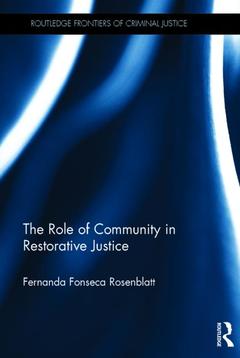The Role of Community in Restorative Justice Routledge Frontiers of Criminal Justice Series
Auteur : Rosenblatt Fernanda

Although restorative justice is probably one of the most talked about topics in contemporary criminology, little has been written about how community involvement in restorative justice translates into practice. While advocates have presented the community as an essential pillar of restorative justice, the rationale for why and how this is the case remains underdeveloped and largely unchallenged. This book offers an empirical and theoretical explanation of what ?community involvement? means and what work it does in restorative justice.
Drawing on an empirical case study and the wider sociological literature, The Role of Community in Restorative Justice examines the involvement of the community in one selected practice of restorative justice and also considers the implications of the English and Welsh experience for development of a more coherent framework for operationalizing community involvement in restorative justice practices. It is argued that restorative justice programmes need to start from a more concrete and up-to-date notion of community. While operationalizing community involvement, they need to acknowledge, all at once: the importance of place; the importance of family links, friendship and other social ties; and the importance of similar social traits and identities.
This book is essential reading for students, researchers and academics in the fields of criminology, criminal justice, sociology, community studies, policy studies, social policy and socio-legal studies. This book will also be valuable reading for a variety of practitioners and policymakers, particularly working with restorative justice and youth justice.
Introduction 1. The Restorative Justice ‘Spirit' 2. Restorative Justice’s Problematic Appeals to Community, 3. Selecting a Case Study of Community Involvement in Restorative Justice 4. Notes on an Empirical Study 5. Youth Offender Panels: a Play in Three Acts 6. The Role of Community in Youth Offender Panels 7. Towards a Coherent Framework for Operationalizing Community Involvement in Restorative Justice Programmes Conclusions.
Fernanda Fonseca Rosenblatt is an Assistant Professor in Law at the Catholic University of Pernambuco (UNICAP), Brazil, where she teaches Criminal Law and Criminal Procedure. Fernanda completed her DPhil in Criminology at the Centre for Criminology, University of Oxford, in January 2014. In 2005 she was awarded a Master’s degree from the Catholic University of Leuven, Belgium. Fernanda is currently a member of the Executive Committee of the World Society of Victimology. She is also a member of the Asa Branca Research Group of Criminology (UNICAP, Brazil). Her areas of expertise are: Restorative Justice, Community (Justice), Youth Justice and Street Children.
Date de parution : 04-2015
15.6x23.4 cm
Date de parution : 11-2016
15.6x23.4 cm
Thèmes de The Role of Community in Restorative Justice :
Mots-clés :
Community Panel Members; Community Justice; Restorative Justice; Community involvement; Youth Offender Panels; Criminal Justice; Referral Order; Offender; Restorative Justice Processes; Referral Order Process; Restorative Justice Practices; Restorative Justice Programmes; YOT Worker; Restorative Justice's Appeals; Young Men; Victim Offender Mediation Programmes; Initial Panel Meeting; Panel Meeting; Restorative Justice Literature; Victim Offender Mediation; Family Group Conferences; Restorative Justice Advocates; Youth Justice System; YOT Member; YOT Office; Restorative Justice Initiatives; Panel Members; Youth Justice; YOT Area


